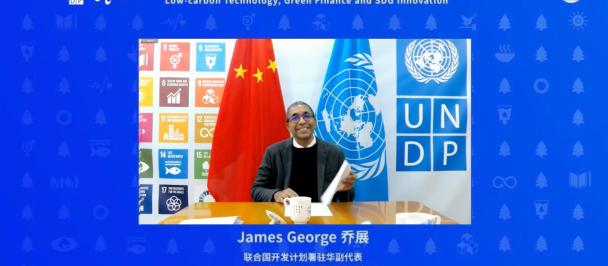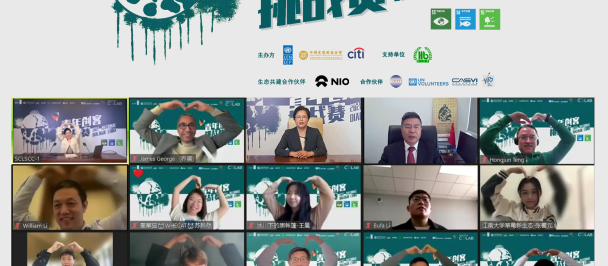13 December - Re:Think 2021, a UNDP-led conference was held today in parallel in the cities of Beijing and Chengdu to spark ideas and galvanize actions to unleash the potential of cities in pursuit of a net-zero future.
Re:Think 2021 was hosted by the United Nations Development Programme (UNDP) and the Management Committee of Chengdu High-tech Zone, supported by the China International Center for Economic and Technological Exchanges (CICETE) under the Ministry of Commerce, and the Institute for Sustainable Development Goals of Tsinghua University as an academic partner. This is the second Re:Think conference, an annual multi-stakeholder innovation event initiated by UNDP’s SPARK SDG innovation Lab in Chengdu.
“Decarbonizing cities is critical. With 70% of emissions coming from cities, they will determine whether we realize a low-carbon future, and mend our relationship with the planet”, said Beate Trankmann, UNDP Resident Representative in China in her opening remarks.
“Following the COP26 climate summit, accelerated action is needed in order to keep global warming within 1.5°C by the end of the century. Ensuring that cities are low-carbon will be critical for countries around the world to meet climate commitments, including in China where the government has set ambitious targets of carbon peaking before 2030 and carbon neutrality by 2060,” she added.
Re:Think 2021 was themed “Innovative Pathways Towards Net-zero Cities”, designed as a platform for policy makers, the business community, and academia to come together and discuss innovation in policy, technologies, and financing that can catalyzes climate actions, as well as the leading role that hi-tech industrial zones and enterprises within them can play in developing and piloting low-carbon solutions.
During his keynote speech, Liu Yanhua, former minister of science and technology, noted that 6 provinces, 81 cities, and 52 industrial zones have been designated as low-carbon pilot zones in China. “This is a systematic approach that requires interactions between the government, private sector and society, as well as transformation in manufacturing and lifestyles,” said Liu. He also highlighted the value of global cooperation between countries and cities highlighting specific areas for collaboration to build on the momentum from COP26 including low-carbon design in industrial development and the utilization of low-energy resources.
George Ronald Gray, Chief Economist, and Head of the Strategic Policy Engagement Unit at UNDP emphasized the importance of continuing to raise ambition levels following COP26. “The bigger ambition reflected in carbon neutral pledges will need to be matched with equal ambition in implementation,” stated Gray.
“Cities are battlefronts for climate action and green growth,” he added. “It is great to see coalitions emerging, and a lot of innovative thinking on what the cities of the future look like and how we build partnerships on the ground to get there.”
Sir Danny Alexander, Vice President at the Asian Infrastructure Investment Bank also highlighted the importance of following-through on updated climate pledges. “Operationalizing these commitments requires laws, regulations, policies, action plans, and investment opportunities that need to be created,” stated Alexander. He added that, “High-level leadership is key towards effectively financing climate and development objectives and managing co-benefits and trade-offs, and China has shown considerable leadership in this regard.”
The first panel of the conference looked at the role of local governments in decarbonization and scaling-up green technologies. In particular, leading corporate executives and researchers of emerging technologies discussed how cities can support the private sector and hi tech zones to reduce emissions and accelerate a low-carbon transition. Recommendations included leveraging green technologies and building long-term mechanisms to encourage decarbonization through tax incentives, financial support, and other policy innovations.
In her keynote in the afternoon, Fabienne Michaux, Director of UNDP SDG Impact Initiative, recognized the importance of integrating the SDGs into decision-making at all levels, both in government and enterprises. “Better transparency & reporting is necessary and important, but just one piece of the puzzle – on its own it’s insufficient to achieve the change we need to see,” Michaux stated.
“There must be a shift from thinking about sustainability as an “add-on” to business, to using SDGs strategically to make decisions,” Michaux added. “SDG Impact helps business and investors put sustainability and the core of management decisions and direct capital to where it can make the most difference to people and planet.”
The second panel discussion focused on how carbon trading can help to support efforts to achieve net-zero. Top experts and executives of Shanghai, Beijing, and Sichuan carbon exchanges shared lessons learned and discussed the critical role of green finance in China’s green transition. In particular, panelists emphasized the need for action on further strengthening emission trading systems to effectively reduce carbon emissions, as well as how enterprises should adapt and participate in carbon markets to facilitate their own low-carbon transition.
During the conference, the second edition of a pioneering baseline study series looking how enterprises in China taking actions to align business strategies and operations with the SDGs was also launched as a joint effort by UNDP, PwC, and China Chamber of International Commerce (CCOIC).
Titled Pathway to Net Zero: SDG Practices of Enterprises in China, this year’s edition of the study has a special focus on how China’s recent climate commitments have encouraged companies to pursue low carbon initiatives and reexamine their operations. Following the launch event, researchers and business executives from a variety of sectors came together in a panel to share their practices in integrating SDGs into corporate governance and discuss how they are adapting to the changing policy environment following China’s dual carbon goal.
At the same time, the launch ceremony of the INSPIRO Fellowship, was held during a parallel session in Chengdu. The one-year program is bringing together more than fifty outstanding tech entrepreneurs from China and Europe across various industries including biotech, hardware, green tech, and digitalization. During the ceremony, extensive discussions on topics such as cross-border partnership, women in the tech industry, and tech for social good took place among fellows from various cultural backgrounds.
The first cohort of INSPIRO will last until September 2022, forming a community to share ideas and spark conversations about business and technology, promote technologies that generate positive social impact, and create opportunities for business partnership between China and Europe in the post-pandemic era.

 Locations
Locations

